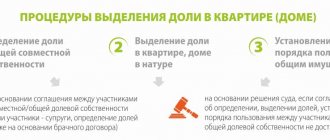Consent to a spouse to pledge real estate is a unilateral transaction in which one spouse gives consent to the second spouse to pledge (mortgage) the property.
This consent is required to conclude a transaction and register it with Rosreestr in the case where the spouses maintain the legal regime of common joint property and they did not enter into a marriage contract. This consent also allows the pledgee (usually a bank) to insure itself in the event that the spouse challenges the pledge agreement and, in the event of a violation of the secured obligation, forecloses on the property.
List of documents:
- passport of the spouse who gives consent,
- marriage certificate,
- scan or photocopy of the current passport of the spouse to whom consent is given,
- address, cadastral number and (or) other details of the property.
Rates:
| 500 rub. | 1200 rub. + 100.00 rub. for each subsequent item of the transaction, starting from the 2nd. At the same time, the total size of the UPTC should not exceed 2100 rubles. |
For preliminary preparation, send documents to the following email address:
We are located at: Moscow, st. Yauzskaya, house 8, building 2
Do you need your spouse's consent to pledge an apartment?
- The spouse’s consent to pledge the apartment is not required if the housing was purchased before the formalization of the relationship or was inherited, or donated by relatives, and so on.
- A notarized consent will be required if the property is jointly owned. In this case, it does not matter which share belongs to whom. Despite the fact that this law is interpreted ambiguously, we recommend that you draw up this document.
- If we are talking about mortgaging a spouse’s apartment, then not only consent will be required, but also a notarized general power of attorney to carry out the procedure. It will be required if the housing is registered in the name of the second spouse and does not belong to the borrower.
In cases specified by law, before completing a transaction, it is necessary to first obtain the notarized consent of the spouses of its parties. This legislative requirement is aimed at protecting the rights and legitimate interests of spouses of participants in civil transactions, preventing abuse and illegal deprivation of property.
Failure to comply with such a requirement gives the injured spouse the right to recognize the relevant transaction as invalid and, through the procedure of restitution, return certain objects to the joint property of the spouses. Let's look at when this might happen. The law provides for three cases when the notarial consent of the spouse is required to complete a transaction (clause 3 of Article 35 of the RF IC): 1) for one of the spouses to enter into a transaction for the disposal of property, the rights to which are subject to state registration (rights to real estate, to the results of intellectual property); activities and equivalent means of individualization); 2) a transaction for which the law establishes a mandatory notarial form (for example, transactions with shares in the authorized capital of an LLC, rent); 3) a transaction subject to mandatory state registration (purchase and sale of an enterprise as a property complex, real estate lease agreement concluded for a period of more than 1 year). Since clause 3 of Art. 35 of the RF IC establishes a specific form of obtaining consent to a transaction - exclusively notarial, it cannot be expressed in any other way (clause 55 of the Resolution of the Plenum of the Supreme Court of the Russian Federation dated June 23, 2015 N 25 “On the application by courts of certain provisions of Section I of Part One of the Civil Code of the Russian Federation"). Notarial consent is not required if the property that is the subject of the transaction belongs by right of ownership exclusively to the spouse who makes the transaction (for example, the spouse received it by inheritance or as a gift, which excludes it from the common marital property). In addition, notarial consent is also not required in a situation where the transaction is carried out simultaneously by both spouses as one of its parties: for example, both spouses mortgage an apartment in favor of a bank or other creditor as security for the fulfillment of their obligations to it. The list of cases when it is necessary to obtain the preliminary notarial consent of the spouse to complete a transaction is exhaustive and is not subject to broad interpretation. Accordingly, all other transactions that do not fall under the list provided by law can be carried out by participants in civil transactions without restrictions. It is possible to alienate property without the consent of the spouse, even if it is of high value (for example, an excavator), since such a transaction does not fall under the list of cases when it is required (Appeal ruling of the Stavropol Regional Court dated June 28, 2016 in case No. 33-5012/2016 ). In particular, such consent is not required to conclude a surety agreement, despite the fact that in the future, if the debtor violates the obligations secured by the surety, there may be a risk of foreclosure on the common marital property according to the claims of the creditor who has not received fulfillment from the main debtor. A guarantee, as one of the ways to ensure the fulfillment of an obligation for which the guarantor is personally liable, is not a transaction for the disposal of the common property of the spouses. A surety agreement is also not a transaction requiring notarization and (or) registration in the manner prescribed by law, and therefore its conclusion does not require obtaining the notarial consent of the other spouse. The conclusion of a surety agreement does not mean the disposal of any property acquired jointly during marriage, but only the assumption by the guarantor of the obligation to answer jointly or subsidiarily in the event of failure by the debtor to fulfill his obligations. In this case, the guarantor is liable only with his personal property. For all matrimonial property, if the guarantor does not have enough personal property to satisfy the creditor's claims, foreclosure cannot be applied; it is allowed only in part of the share due to him (Decision of the Supreme Court of the Russian Federation dated April 12, 2016 N 18-КГ16-23). In addition, the notarial consent of the spouse is also not required in the case where the spouse makes a transaction, the rights under which are subject to state registration, but he does not dispose of any property under it. So, for example, a transaction for the purchase of a land plot provided under a lease agreement does not require obtaining notarial consent from the tenant, since he does not dispose of the property, but, on the contrary, acquires ownership of it (Decision of the Supreme Court of the Russian Federation dated 02/04/2016 in the case N 308-KG15-13732, A32-45693/2014). In the notarial consent, the spouse indicates a specific transaction that he approves, or indicates general powers, for example, giving his spouse the right to sell an apartment or other real estate at any price and on any conditions at his discretion. If the property consists of several parts (for example, premises in a building), then if there is consent to the alienation of the entire object, its alienation not in one transaction, but in parts, or the sale of just one or several parts will not constitute a violation of the consent received, since the spouse initially expressed his will to alienate the entire property (Decision of the Supreme Court of the Russian Federation dated May 31, 2016 N 18-КГ16-33). The terms of such a transaction should not violate the principles of reasonableness and good faith when the parties agree on the price and other parameters. It must be taken into account that a simple indication in the notarial consent that one spouse trusts the other to carry out transactions with property on any terms at his discretion will not be sufficient to determine the scope of his powers. Such an indication means that the second spouse is in any case obliged to sell the apartment at a price not lower than its average market value. Thus, the spouse of the seller of the disputed property, which is subject to the regime of joint ownership, had the right to count on reasonable compensation for this property, legally assuming conscientious behavior of persons when making transactions with such property. Knowingly dishonest exercise of civil rights (abuse of rights) by virtue of the provisions of Art. 10 of the Civil Code of the Russian Federation is not allowed, and if the court establishes such circumstances in the actions of a party in a civil legal relationship, other measures provided for by law are subject to application, taking into account the nature and consequences of the abuse committed. In this regard, the sale of an apartment at a price below its market value with a significant deviation will be considered by the court in the event of a dispute as an abuse of right, which will give grounds to consider it invalid by virtue of Art. 168 of the Civil Code of the Russian Federation (Definition of the Supreme Court of the Russian Federation dated March 17, 2015 N 18-КГ15-17). In the absence of notarial consent, the corresponding transaction may be declared invalid at the request of such a spouse within a year from the day when he learned or should have learned about the completion of this transaction (Clause 3 of Article 35 of the RF IC). Let us note that state control over compliance with the rights of spouses of participants in transactions requiring notarial consent is not only about the possibility of obtaining subsequent judicial protection. Intervention in the transaction by authorized government bodies is possible at an earlier stage. So, for example, when making transactions with real estate objects, the registering authority, which is presented with a package of documents for registration by their participants, in the absence of notarial consent from the spouses, suspends the registration of the transaction or the transfer of rights under it, providing the opportunity to eliminate the violation, and if the reasons are not eliminated, interfering with the state registration of rights - makes a decision to refuse state registration. As judicial practice shows, courts recognize refusals of state registration on this basis as acceptable (Appeal ruling of the Novosibirsk Regional Court dated June 28, 2016 in case No. 33-6436/2016). The requirement to obtain notarial consent for a transaction applies not only to the case when the seller is married, but also to the case when he was divorced, but did not change the regime of common joint property with his former spouse. This is due to the fact that divorce in itself does not change the legal regime of the spouses’ property. If after the divorce the property was not divided, the regime of common property remains in relation to it and for its alienation compliance with clause 3 of Art. 35 RF IC, i.e. obtaining notarial consent on a general basis (Determination of the Primorsky Regional Court dated 07/09/2014 in case No. 33-5797).
How our cooperation is built:
Leave a request. Fill out the form on the website and our specialist will contact you. Be prepared to provide copies, scans or photos of documents.
Meeting at the office. If the application is approved, you must go to the office with the original documents to resolve issues regarding the collection of remaining documents, the loan amount, conditions and date of signing the agreement.
Registration of the agreement. On the appointed day, the contract is signed in our office or at the Rosreestr branch, and submitted along with all documents for state registration.
Receiving funds. After completing registration, you receive the entire loan amount in cash or to a bank account. It is possible to pay an advance before registration, if necessary.
Reviews
Vera Gultyaeva
When concluding a mortgage agreement, it was necessary to provide the consent of the spouse to carry out the procedure. I contacted a notary office, where the essence of the issue was explained to me in detail. The determination of the language in the consent was based on the type of transaction being entered into. The whole issue was resolved as quickly as possible and without unnecessary problems.
Denis Kolpitsyn
My wife and I decided to sell the apartment, so we immediately went to the notary. It turned out to be impossible to simply conclude an agreement, since we were officially married at the time of purchase, and we have equal shares. After receiving detailed answers to questions and drawing up an agreement, we received an official form with all the seals and certification. The contract itself was signed by the same notary.
Alexander Klevakin
I decided to get a loan secured by a plot of land. The tax authority provided a certificate stating that this property is owned by several persons: me and my ex-wife. I decided to find out whether it was necessary to formalize the consent of my ex-wife, since we did not have a division of property. The notary said that based on Federal Law No. 218 of July 13, 2015, the property is in common ownership in equal shares, so it is impossible to do without a document. Thanks to the company for the consultation.
Banks are wary
For future debtors, unlike current ones, the interpretation of the Supreme Court will most likely add difficulties when applying for a loan.
The requirements of the credit institution will change not for the better for the borrower. Credit institutions will be forced to tighten requirements for borrowers. As Lipatov notes, when applying for a car or consumer loan, the written consent of the 2nd spouse may be required. According to Alexander Kopeiko, 1st Deputy Chairman of the Board of Svyaz-Bank, there will be no tightening of requirements for borrowers. The Supreme Court simply clarified the interpretation of the norm of the Family Code: but essentially nothing has changed. And since nothing has changed, why do banks need to revise their rules for issuing loans? Vladislav Kotelnikov, Deputy Director of the Troubled Assets Department at VTB24, is considering the possibility of requiring written consent from the 2nd spouse to apply for any loan.
VAT – 2022
The best speaker on tax topics, , will prepare you for filing your return on January 14 . There are 10 out of 40 places left for the online workshop . The flow is limited, as there will be live communication with the teacher live. Hurry up to get into the group. Sign up>>>




